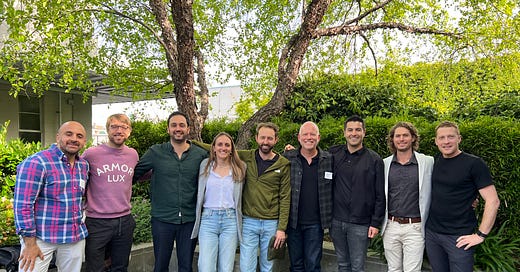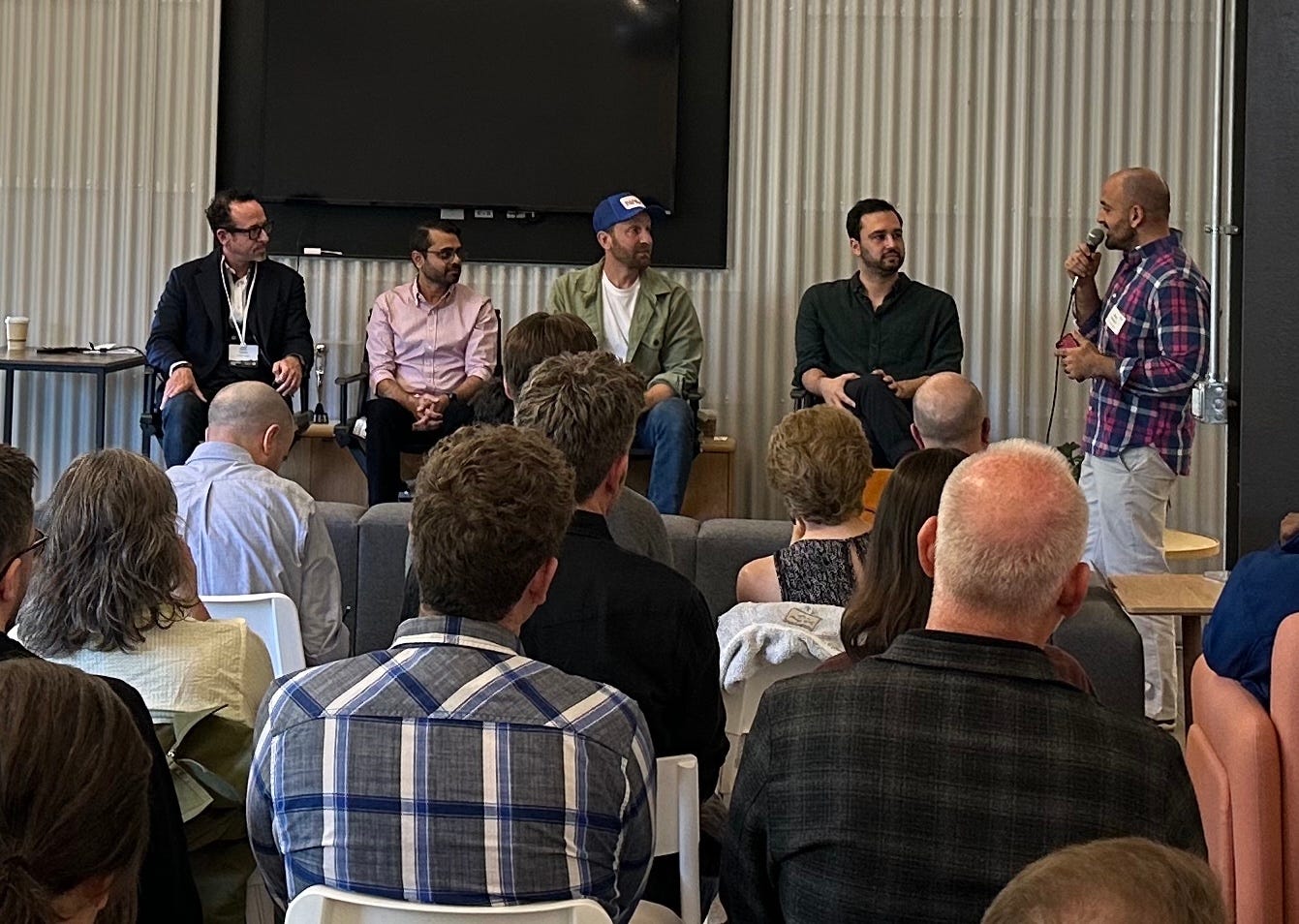By Matthew Stotts and Jahed Momand, Co-Founders of Cerulean Ventures
As the most active investors in the nature tech space since 2022, Cerulean Ventures were thrilled to bring together our portfolio founders, investors, and government representatives for our Earth Day gathering during San Francisco Climate Week 2025. The event showcased how our portfolio companies are leveraging nature tech to address our most pressing environmental challenges, creating new pathways for climate action and environmental stewardship coupled with broad economic opportunity. One of our most pressing environmental challenges is to build a robust economy that provides resilience and economic opportunity for billions of indigenous people and local communities who live and work in nature. Each of over 35 portfolio companies of Cerulean Ventures are doing just that.
In this gathering, we highlighted a fifth of the portfolio, working in two critical domains where innovation is urgently needed: Earth observation and agricultural insights powered by AI, and next-generation solutions for accelerating renewable energy systems. Throughout the discussions, a powerful narrative emerged about the transformative potential of technology when directed by deeply mission-driven entrepreneurs—the people we're proud to back at Cerulean.
Reimagining Earth Observation & Smallholder Agriculture Through an AI Lens
Our first panel, moderated by Jahed Momand, featured four pioneering founders from our portfolio who are revolutionizing how we gather and interpret Earth data:
Jules Achard, Co-founder and CEO of Abeya, shared how his company is reshaping soft commodity supply chains in the Global South to enable food manufacturers to invest in farmer resilience. Jules emphasized how affordable geospatial data empowers farmers with greater negotiating power and enables critical systems for tracking diseases and alerting farming communities.
Dr. Dan Hammer, Co-founder of Clay (a nonprofit open-source large earth observation model) and Legend (LGND) (a seed-stage for-profit connecting AI-powered earth observation models to applications), highlighted how we're still in the early stages of training models on Earth observation data compared to language models. Dan showed how AI has drastically changed the cost curve for using the valuable information from satellite imagery, offering a new interface that reduces both cost and complexity.
Jinal Surti, Co-founder and CEO of Epoch, explained how his London-based company produces crucial "first-mile" data at the producer level for soft commodity supply chains including rubber, timber, coffee, cocoa, palm oil, and soy. Jinal noted that agriculture has digitized slowly due to the need for manual, on-the-ground data collection, but emphasized how geospatial data and AI are revolutionizing this process—with the critical caveat that training data remains essential for leveraging foundational models effectively.
Raviv Turner, Founding partner at Nature X Studio, which builds and invests in nature AI technologies, described the current state of geospatial intelligence as slow, expensive, and requiring specialized GIS expertise—with only a tiny percentage of satellite images ever being analyzed. Raviv is developing a "geo agent" that enables non-experts to access geospatial intelligence using natural language queries, with applications ranging from flood risk analysis to fire monitoring and biodiversity assessment.
What became clear through this discussion is that by dramatically reducing the cost and complexity of getting value from Earth observation data, our portfolio companies are enabling businesses to pursue profit while simultaneously improving outcomes for climate and biodiversity, and improving incomes and opportunity for small hold farmers.
AI as the Accelerant for Our Renewable Energy Transition
Our second panel was moderated by Matthew Stotts. It brought together three visionary founders from our portfolio who are addressing critical bottlenecks in our renewable energy transition:
Morgan Babbs, Co-founder of Popular Power, showcased her company's end-to-end B2B SaaS platform that provides AI insights for distributed solar companies. Drawing on her experience in the solar sector and focus on digital inclusion and wealth equality, Morgan explained how Popular Power helps solar companies scale by consolidating monitoring and delivering insights to avoid operational risks. She highlighted the importance of ensuring distributed solar assets perform efficiently post-deployment and emphasized climate resilience in terms of access and equitable transition, noting that "the future is here but not evenly distributed."
Dr. Tom Nudell, who leads Piq Energy (currently in stealth mode), presented his AI-powered platform designed to eliminate the grid interconnection bottleneck in the US. With his PhD in power systems, Tom provided a sobering assessment of what's broken in our transmission grid: systematic underinvestment in aging infrastructure and outdated, manual processes for connecting new generation. He explained how Peak Energy's software automates these processes, allowing evaluations to run in minutes instead of weeks, effectively acting as a "lubricant" for the grid.
Dr. Daniel Howard from Quantum Energy shared insights from his SaaS platform that provides AI-powered impact analytics for energy developers, corporations, and utilities. As a national expert in energy system optimization and creator of the Total View energy platform, Daniel explained how Quantum's data has helped large clean energy projects overcome regulatory opposition and delays. He framed economic and societal resilience as a nexus of grid reliability, human health, and ecosystem health, advocating that extractive, polluting energy infrastructure cannot compete on a levelized basis when renewables are clearly the cheapest, most resilient, and cleanest solutions.
The panel made global analogies to the U.S. grid with over 2.6 terawatts of renewable projects currently stalled in interconnection queues (about $2 trillion in potential investment). In the post-industrial West, calcified, generations-old grids have become the primary bottleneck in our energy transition, while in the Global South, leapfrog opportunities through rapid decentralization and networked-coordination are emergent. Our portfolio companies are addressing this challenge head-on with AI-powered solutions that can dramatically accelerate the pace at which clean energy projects connect to the grid and allow emerging economies to accelerate renewables even more rapidly and enabling aging grids to keep pace with positive change.
The Common Thread: Mission-Driven Founders at the Edge of Climate Innovation
Our portfolio founders are actively applying frontier technologies to existential challenges that our current economic systems are failing to address effectively. Beyond the technological innovation, each demonstrates a deep commitment to impact that builds on profit-driven, scalable businesses.
At the event, we were also joined by other remarkable founders from our portfolio, including Saif Bhatti of Renoster, Trevor Laudate of Ecodrive, Onur Eren of Covalent, Peter Olivier an EIR, and T. Dalton Combs of Jasmine Energy. The event was hosted by Rene Reinsberg at the CELO offices in San Francisco. We were honored to welcome special guests including Josh Fryday, Chief Service Officer of the State of California and the creator of the California Climate Action Corps; Marshall Kirkpatrick of Earth Catalyst, a tech-entrepreneur turned climate researcher and writer; impact entrepreneur and technologist Ben West; and many of the limited partners and technical advisors who make our work at Cerulean Ventures possible.
The gathering highlighted why we believe so strongly in building the Cerulean Network. Our founders work passionately on climate justice, public health, equitable access, biodiversity, and soil health—revealing what one participant described as "a deep human heart" driving their work. But these scientists, technologists and entrepreneurs are equally committed to building Earth-scale solutions to problems they deeply care about solving.
An Invitation: The Cerulean Network
This combination of cutting-edge technology deployment and mission-driven purpose created a palpable sense of hope throughout our Earth Day event. Despite tackling challenges described as "existential," "big," and "scary," our founders give us confidence that meaningful progress is not only possible but actively underway.
Events like this are essential in the climate tech ecosystem. Attendees gained access to insights about emerging innovations, critical industry bottlenecks, and transformative solutions still in their early stages but showing immense potential.
Perhaps more importantly, the event fostered connections among entrepreneurs, investors, and government representatives all focused on mission-driven work at the intersection of technology and climate action. In a space where collaboration is essential for success, these relationship-building opportunities are invaluable.
We're excited to continue these critical conversations at our next portfolio-focused event during New York Climate Week in September—an opportunity to witness the rapid evolution of technology-driven climate solutions and the growing impact of our portfolio. Before then we’ll be at Super Return Berlin, June 2.
[At Cerulean Ventures, we're proud to back founders tackling our most pressing environmental challenges by creating inclusive business-models based on inclusive economics and the application of frontier technologies like artificial intelligence, satellite imaging & sensing, and distributed ledgers.]







